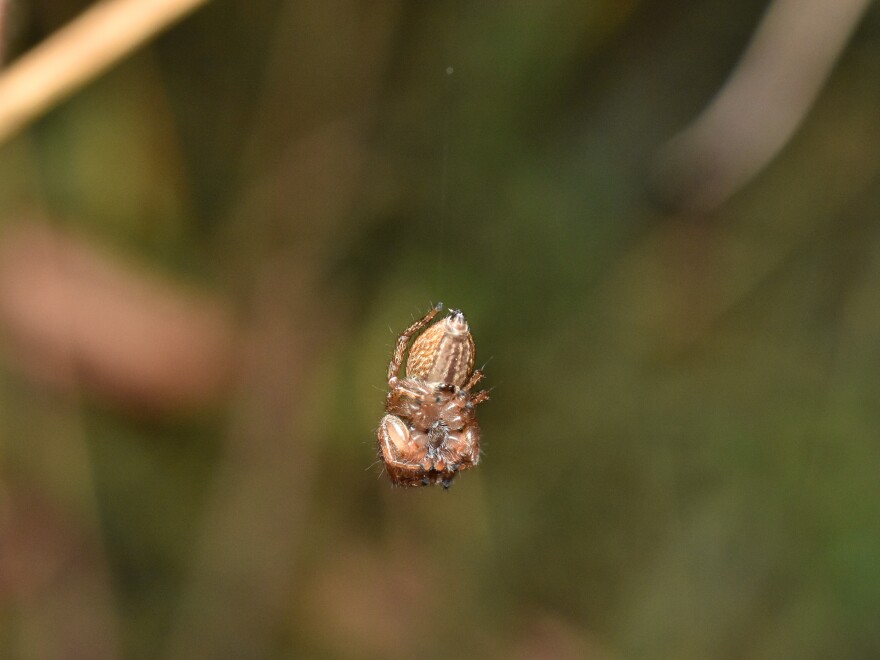Jumping spiders, which use their four pairs of big eyes to spot prey so that they can pounce, can spend a lot of the night just hanging around—literally.
The gorilla jumping spider, Evarcha arcuata, frequently hangs by a single thread at night, suspended in mid-air for hours. Researchers suspect these visually-oriented spiders may cope with darkness by switching to a strategy that lets them use vibrations as a warning signal of danger.
"Maybe they use this silk as a kind of an alarm system or as a way of getting out of reach for predators," says Harvard University researcher Daniela Roessler, who notes that this new finding shows how science seems to know very little about the night-time resting habits of tiny critters, even common ones.
Roessler had been experimenting with jumping spiders when the pandemic hit, so she went back home to Germany and collected some of the local gorilla jumping spiders. That's when she happened to notice that these spiders had a strange nocturnal ritual.
The first time she saw it was one night after coming home from dinner. "I switched on the light," Roessler recalls, "and I looked on the windowsill and was like, 'Oh God, what happened to these animals? Are they dead?' All of them were hanging from the ceiling of the little plastic boxes that I put them in."

Jumping spiders don't weave webs to capture prey, but they are known to build silken retreats for resting in rolled up leaves and other protected spots. But this was something very different. So Roessler went back out to the spot where she collected these spiders, this time in the dark.
"We found a lot of them. So basically, we found three times the number of individuals during the nights compared to what we found during the day because it's just so easy to spot them when they hang from the vegetation like this," she says.
The hanging spiders were easy for the researchers to find—but perhaps not as easy for crawling nocturnal predators, like ants. And when Roessler would gently touch the silk thread, the jumping spiders would all almost always drop to the ground and scurry away.
Interestingly, though, if she touched the plant they were hanging from, "none of the females would drop down. They would all just climb back up," says Roessler, who explains that only about half of the males would climb up, and the others would drop in this situation. She calls this "really weird...but it was very consistent. We had a large number of spiders. So that is definitely something to look at further in the future."
Still, she notes that the spiders she had in boxes at home would still sometimes make a silken retreat to hide in. "And that meant that they were switching between different resting strategies," says Roessler. "Something informs them about how to make this choice, where to spend the night, how to spend the night."
She's still trying to figure out what's going on, and says there hasn't been much past research looking at resting behaviors among invertebrates in the wild, in part because it's a challenging thing to study.
"Most of the people that have looked at sleep in nature tend to be focused on mammals and birds," agrees Paul Shaw of Washington University School of Medicine in St. Louis, who adds that most researchers have long thought that a complex brain was required for sleep.
In fact, a couple of decades ago, when two groups of researchers established that fruit flies actually go to sleep, the idea met with a lot of resistance. "It took a few years for us to be able to win over the skeptics, and now it's fairly well accepted," says Shaw.
In his view, these jumping spiders are clearly sleeping. "I guarantee it, one hundred percent," he says.
Generally, the fact that animals rest or sleep even though it makes them less alert to danger and more vulnerable to predators has been seen as evidence that sleep must serve some essential biological function.
For jumping spiders, however, "what I thought was really interesting was that they were taking about this suspension as being something that helps them avoid predation," says Amita Sehgal, a sleep researcher at the Perelman School of Medicine at the University of Pennsylvania.
Increasingly, she says, scientists are examining sleep in invertebrates ranging from worms to jellyfish to hydras. "I think it's really caught on, this idea that if sleep is such an important state, it is probably not restricted to just a few species and is more widespread among the animal kingdom," says Sehgal.
Roessler says that since she published her findings, others have reported seeing this nocturnal suspension behavior in jumping spiders in California, New Zealand, and India. "We think that it is a very widespread phenomenon," she says, adding that there's still a lot to learn about these common, charismatic spiders and why they do the things they do.
"We kind of always feel like the things in the backyard, we already know so much about," says Roessler, "but it's crazily really not true."
Copyright 2023 NPR. To see more, visit https://www.npr.org.


